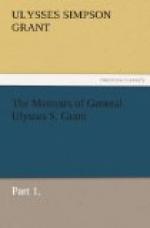The battles of Palo Alto and Resaca de la Palma seemed to us engaged, as pretty important affairs; but we had only a faint conception of their magnitude until they were fought over in the North by the Press and the reports came back to us. At the same time, or about the same time, we learned that war existed between the United States and Mexico, by the acts of the latter country. On learning this fact General Taylor transferred our camps to the south or west bank of the river, and Matamoras was occupied. We then became the “Army of Invasion.”
Up to this time Taylor had none but regular troops in his command; but now that invasion had already taken place, volunteers for one year commenced arriving. The army remained at Matamoras until sufficiently reinforced to warrant a movement into the interior. General Taylor was not an officer to trouble the administration much with his demands, but was inclined to do the best he could with the means given him. He felt his responsibility as going no further. If he had thought that he was sent to perform an impossibility with the means given him, he would probably have informed the authorities of his opinion and left them to determine what should be done. If the judgment was against him he would have gone on and done the best he could with the means at hand without parading his grievance before the public. No soldier could face either danger or responsibility more calmly than he. These are qualities more rarely found than genius or physical courage.
General Taylor never made any great show or parade, either of uniform or retinue. In dress he was possibly too plain, rarely wearing anything in the field to indicate his rank, or even that he was an officer; but he was known to every soldier in his army, and was respected by all. I can call to mind only one instance when I saw him in uniform, and one other when I heard of his wearing it, On both occasions he was unfortunate. The first was at Corpus Christi. He had concluded to review his army before starting on the march and gave orders accordingly. Colonel Twiggs was then second in rank with the army, and to him was given the command of the review. Colonel and Brevet Brigadier-General Worth, a far different soldier from Taylor in the use of the uniform, was next to Twiggs in rank, and claimed superiority by virtue of his brevet rank when the accidents of service threw them where one or the other had to command. Worth declined to attend the review as subordinate to Twiggs until the question was settled by the highest authority. This broke up the review, and the question was referred to Washington for final decision.




